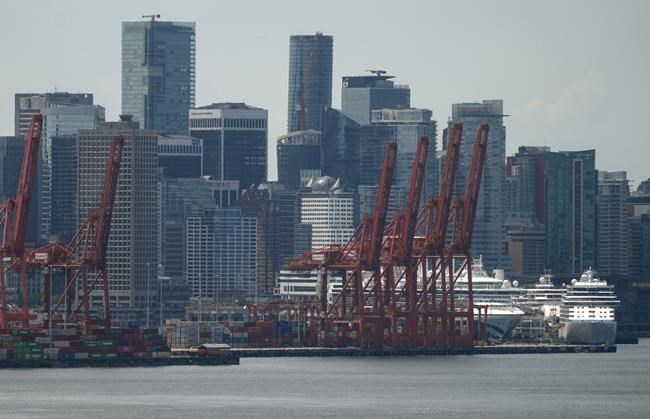
Gantry cranes sit idle above cruise ships and stacks of cargo containers at port during a strike by International Longshore and Warehouse Union Canada workers in the province in Vancouver on Wednesday, July 12, 2023. Work has resumed at British Columbia ports after both sides of the strike agreed to a tentative deal Thursday. THE CANADIAN PRESS/Darryl Dyck
Republished July 14, 2023 - 2:35 PM
Original Publication Date July 14, 2023 - 1:11 AM
VANCOUVER - A logistics researcher said it should take only days for cargo flow to return to pre-strike levels at B.C. ports after a 13-day work stoppage ended with a tentative deal.
Simon Fraser University Prof. Peter V. Hall said the strike of 7,400 International Longshore and Warehouse Union Canada workers could have happened at a worse time, such as the pre-Christmas import spike or peak grain export season.
"I'm sure that there will be someone who will be able to say their specific container of something they needed is delayed several weeks, because that's inevitable," Hall said.
"But we shouldn't rely on specific cases. The majority of what needs to move will move very quickly."
The union and the B.C. Maritime Employers Association reached a tentative deal to resume port operations on Thursday. The association said it would last four years.
University of British Columbia associate Prof. Werner Antweiler said it may take several weeks for all backlogs from the strike to be cleared.
Antweiler said Port of Vancouver statistics showed more than 10 ships waiting to be unloaded at anchor on Friday after idle port operations reduced that number to nearly zero at the start of July.
Port workers were back on the job Thursday afternoon, with the BCMEA saying more than 500 were being dispatched at Vancouver's inner harbour for Friday's 8 a.m. shift.
The Vancouver Fraser Port Authority's operations dashboard on Friday showed the Centerm, Vanterm, Deltaport and Fraser Surrey terminals all "operating normally," with truck waiting times for loading and unloading ranging from under an hour to close to two hours.
Almost 30 vessels were berthed at the Port of Vancouver.
The agreement to end the strike came after federal Labour Minister Seamus O'Regan ordered a mediator to issue terms for a settlement, saying the gap in the deadlocked talks was "not sufficient to justify a continued work stoppage."
The deal is subject to ratification by members of both the union and the maritime employers, and no additional details have been released.
The union has not yet commented on the pact.
Hall and Antweiler said the worst of a major port disruption had been averted, with Antweiler adding that local companies typically had two weeks of inventory to maintain operations.
But major challenges remain on the horizon for B.C.'s ports.
Hall said port employers need to work with the union on significant long-term "structural changes" such as training to deal with the onset of automation, and he hoped a commitment on that front is included in the tentative agreement.
Without it, Hall said the skilled labour shortage at the port and clashes over automation will worsen the performance of ports such as Vancouver.
"If we ever go through another one of these booms in the oil patch, when anybody who's got any kind of technical skills is getting sucked up into that industry, that will just compound what is already a difficult situation," he said. "So those are long-term structural issues that the port industry does need to work on."
Antweiler agreed that ports, employers and workers all need to find a way to deal with automation, a trend sweeping shipping and logistic facilities worldwide. Failure to do so would disadvantage operational efficiency for B.C.'s ports.
He said a World Bank and S&P Global Market Intelligence report released in June placed Vancouver second-last in the world in container vessel wait times for unloading cargo in 2022.
"We do have a significant problem on the West Coast," Antweiler said, noting Prince Rupert as well as U.S. ports such as Los Angeles, Long Beach and Oakland all rank among the bottom 15. "And what that indicates is that we have bottlenecks that are first-and-foremost capacity issues."
"It's all about the cost in the end," he said. "You ship to where you can handle your goods quickly and at the lower cost. If there are other ports that can provide those services better, faster or cheaper than B.C., then we will see that move to these ports."
This report by The Canadian Press was first published July 14, 2023.
News from © The Canadian Press, 2023